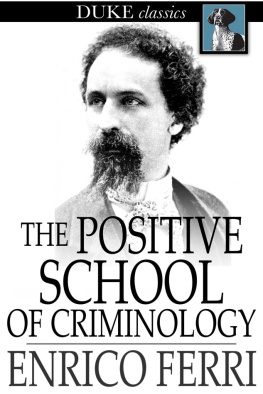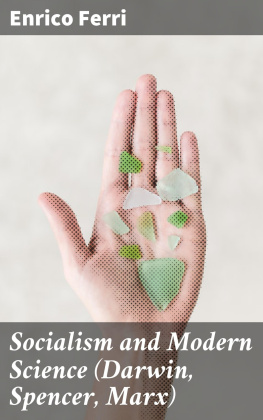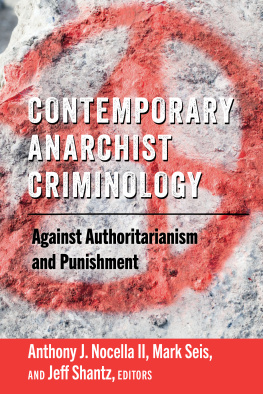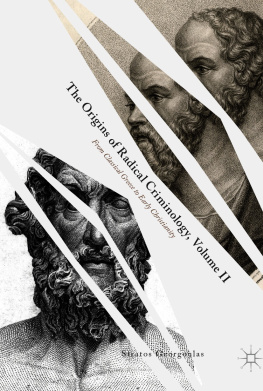Enrico Ferri - The Positive School of Criminology: Three Lectures Given at the University of Naples, Italy on April 22, 23 and 24, 1901
Here you can read online Enrico Ferri - The Positive School of Criminology: Three Lectures Given at the University of Naples, Italy on April 22, 23 and 24, 1901 full text of the book (entire story) in english for free. Download pdf and epub, get meaning, cover and reviews about this ebook. year: 2014, publisher: Duke Classics, genre: Science. Description of the work, (preface) as well as reviews are available. Best literature library LitArk.com created for fans of good reading and offers a wide selection of genres:
Romance novel
Science fiction
Adventure
Detective
Science
History
Home and family
Prose
Art
Politics
Computer
Non-fiction
Religion
Business
Children
Humor
Choose a favorite category and find really read worthwhile books. Enjoy immersion in the world of imagination, feel the emotions of the characters or learn something new for yourself, make an fascinating discovery.
- Book:The Positive School of Criminology: Three Lectures Given at the University of Naples, Italy on April 22, 23 and 24, 1901
- Author:
- Publisher:Duke Classics
- Genre:
- Year:2014
- Rating:3 / 5
- Favourites:Add to favourites
- Your mark:
- 60
- 1
- 2
- 3
- 4
- 5
The Positive School of Criminology: Three Lectures Given at the University of Naples, Italy on April 22, 23 and 24, 1901: summary, description and annotation
We offer to read an annotation, description, summary or preface (depends on what the author of the book "The Positive School of Criminology: Three Lectures Given at the University of Naples, Italy on April 22, 23 and 24, 1901" wrote himself). If you haven't found the necessary information about the book — write in the comments, we will try to find it.
Enrico Ferri was a prominent figure in the early development of the field of criminology. The school of thought that he developed, which came to be known as positivism, sought to identify and address the social, economic and environmental factors that contributed to the emergence of criminal and antisocial behavior in some people. The three lectures in this volume bring together many of Ferris most influential ideas and theories.
Enrico Ferri: author's other books
Who wrote The Positive School of Criminology: Three Lectures Given at the University of Naples, Italy on April 22, 23 and 24, 1901? Find out the surname, the name of the author of the book and a list of all author's works by series.
The Positive School of Criminology: Three Lectures Given at the University of Naples, Italy on April 22, 23 and 24, 1901 — read online for free the complete book (whole text) full work
Below is the text of the book, divided by pages. System saving the place of the last page read, allows you to conveniently read the book "The Positive School of Criminology: Three Lectures Given at the University of Naples, Italy on April 22, 23 and 24, 1901" online for free, without having to search again every time where you left off. Put a bookmark, and you can go to the page where you finished reading at any time.
Font size:
Interval:
Bookmark:

Three Lectures Given at the University of Naples, Italy on April 22, 23 and 24, 1901
First published in 1908
ISBN 978-1-62013-524-2
Duke Classics
2014 Duke Classics and its licensors. All rights reserved.
While every effort has been used to ensure the accuracy and reliability of the information contained in this edition, Duke Classics does not assume liability or responsibility for any errors or omissions in this book. Duke Classics does not accept responsibility for loss suffered as a result of reliance upon the accuracy or currency of information contained in this book.
When, in the turmoil of my daily occupation, I received an invitation,several months ago, from several hundred students of this famousuniversity, to give them a brief summary, in short special lectures, ofthe principal and fundamental conclusions of criminal sociology, Igladly accepted, because this invitation fell in with two ideals ofmine. These two ideals are stirring my heart and are the secret of mylife. In the first place, this invitation chimed with the ideal of mypersonal life, namely, to diffuse and propagate among my brothers thescientific ideas, which my brain has accumulated, not through any meritof mine, but thanks to the lucky prize inherited from my mother in thelottery of life. And the second ideal which this invitation called upbefore my mind's vision was this: The ideal of young people of Italy,united in morals and intellectual pursuits, feeling in their sociallives the glow of a great aim. It would matter little whether this aimwould agree with my own ideas or be opposed to them, so long as itshould be an ideal which would lift the aspirations of the young peopleout of the fatal grasp of egoistic interests. Of course, we positivistsknow very well, that the material requirements of life shape anddetermine also the moral and intellectual aims of human consciousness.But positive science declares the following to be the indispensablerequirement for the regeneration of human ideals: Without an ideal,neither an individual nor a collectivity can live, without it humanityis dead or dying. For it is the fire of an ideal which renders the lifeof each one of us possible, useful and fertile. And only by its help caneach one of us, in the more or less short course of his or herexistence, leave behind traces for the benefit of fellow-beings. Theinvitation extended to me proves that the students of Naples believe inthe inspiring existence of such an ideal of science, and are anxious tolearn more about ideas, with which the entire world of the present dayis occupied, and whose life-giving breath enters even through thewindows of the dry courtrooms, when their doors are closed against it.
Let us now speak of this new science, which has become known in Italy bythe name of the Positive School of Criminology. This science, the sameas every other phenomenon of scientific evolution, cannot beshortsightedly or conceitedly attributed to the arbitrary initiative ofthis or that thinker, this or that scientist. We must rather regard itas a natural product, a necessary phenomenon, in the development of thatsad and somber department of science which deals with the disease ofcrime. It is this plague of crime which forms such a gloomy and painfulcontrast with the splendor of present-day civilization. The 19th centuryhas won a great victory over mortality and infectious diseases by meansof the masterful progress of physiology and natural science. But whilecontagious diseases have gradually diminished, we see on the other handthat moral diseases are growing more numerous in our so-calledcivilization. While typhoid fever, smallpox, cholera and diphtheriaretreated before the remedies which enlightened science applied by meansof the experimental method, removing their concrete causes, we see onthe other hand that insanity, suicide and crime, that painful trinity,are growing apace. And this makes it very evident that the science whichis principally, if not exclusively, engaged in studying these phenomenaof social disease, should feel the necessity of finding a more exactdiagnosis of these moral diseases of society, in order to arrive at someeffective and more humane remedy, which should more victoriously combatthis somber trinity of insanity, suicide and crime.
The science of positive criminology arose in the last quarter of the19th century, as a result of this strange contrast, which would beinexplicable, if we could not discover historical and scientific reasonsfor its existence. And it is indeed a strange contrast that Italy shouldhave arrived at a perfect theoretical development of a classical schoolof criminology, while there persists, on the other hand, the disgracefulcondition that criminality assumes dimensions never before observed inthis country, so that the science of criminology cannot stem the tide ofcrime in high and low circles. It is for this reason, that the positiveschool of criminology arises out of the very nature of things, the sameas every other line of science. It is based on the conditions of ourdaily life. It would indeed be conceited on our part to claim that we,who are the originators of this new science and its new conclusions,deserve alone the credit for its existence. The brain of the scientistis rather a sort of electrical accumulator, which feels and assimilatesthe vibrations and heart-beats of life, its splendor and its shame, andderives therefrom the conviction that it must of necessity provide fordefinite social wants. And on the other hand, it would be an evidence ofintellectual short-sightedness on the part of the positivist man ofscience, if he did not recognize the historical accomplishments, whichhis predecessors on the field of science have left behind as indelibletraces of their struggle against the unknown in that brilliant andirksome domain. For this reason, the adherents of the positive school ofcriminology feel the most sincere reverence for the classic school ofcriminology. And I am glad today, in accepting the invitation of thestudents of Naples, to say, that this is another reason why theirinvitation was welcome to me. It is now 16 years since I gave in thissame hall a lecture on positive criminology, which was then in itsinitial stages. It was in 1885, when I had the opportunity to outlinethe first principles of the positive school of criminology, at theinvitation of other students, who preceded you on the periodic waves ofthe intellectual generations. And the renewal of this opportunity gaveme so much moral satisfaction that, I could not under any circumstancesdecline your invitation. Then too, the Neapolitan Atheneum hasmaintained the reputation of the Italian mind in the 19th century, alsoin that science which even foreign scientists admit to be our specialty,namely the science of criminology. In fact, aside from the two terriblebooks of the Digest, and from the practical criminologists of the MiddleAges who continued the study of criminality, the modern world opened aglorious page in the progress of criminal science with the modest littlebook of Cesare Beccaria. This progress leads from Cesare Beccaria, byway of Francesco Carrara, to Enrico Pessina.
Enrico Pessina alone remains of the two giants who concluded the cycleof classic school of criminology. In a lucid moment of his scientificconsciousness, which soon reverted to the old abstract and metaphysicaltheories, he announced in an introductory statement in 1879, thatcriminal justice would have to rejuvenate itself in the pure bath of thenatural sciences and substitute in place of abstraction the living andconcrete study of facts. Naturally every scientist has his function andhistorical significance; and we cannot expect that a brain which hasarrived at the end of its career should turn towards a new direction. Atany rate, it is a significant fact that this most renownedrepresentative of the classic school of criminology should have pointedout this need of his special science in this same university of Naples,one year after the inauguration of the positive school of criminology,that he should have looked forward to a time when the study of naturaland positive facts would set to rights the old juridical abstractions.And there is still another precedent in the history of this university,which makes scientific propaganda at this place very agreeable for apositivist. It is that six years before that introductory statement byPessina, Giovanni Bovio gave lectures at this university, which hepublished later on under the title of "A Critical Study of CriminalLaw." Giovanni Bovio performed in this monograph the function of acritic, but the historical time of his thought, prevented him fromtaking part in the construction of a new science. However, he preparedthe ground for new ideas, by pointing out all the rifts and weaknessesof the old building. Bovio maintained that which Gioberti, Ellero,Conforti, Tissol had already maintained, namely that it is impossible tosolve the problem which is still the theoretical foundation of theclassic school of criminology, the problem of the relation betweenpunishment and crime. No man, no scientist, no legislator, no judge, hasever been able to indicate any absolute standard, which would enable usto say that equity demands a definite punishment for a definite crime.We can find some opportunistic expedient, but not a solution of theproblem. Of course, if we could decide which is the gravest crime, thenwe could also decide on the heaviest sentence and formulate a descendingscale which would establish the relative fitting proportions betweencrime and punishment. If it is agreed that patricide is the gravestcrime, we meet out the heaviest sentence, death or imprisonment forlife, and then we can agree on a descending scale of crime and on aparallel scale of punishments. But the problem begins right with thefirst stone of the structure, not with the succeeding steps. Which isthe greatest penalty proportional to the crime of patricide? Neitherscience, nor legislation, nor moral consciousness, can offer an absolutestandard. Some say: The greatest penalty is death. Others say: No,imprisonment for life. Still others say: Neither death, nor imprisonmentfor life, but only imprisonment for a time. And if imprisonment for atime is to be the highest penalty, how many years shall it lastthirty, or twenty-five, or ten?
Font size:
Interval:
Bookmark:
Similar books «The Positive School of Criminology: Three Lectures Given at the University of Naples, Italy on April 22, 23 and 24, 1901»
Look at similar books to The Positive School of Criminology: Three Lectures Given at the University of Naples, Italy on April 22, 23 and 24, 1901. We have selected literature similar in name and meaning in the hope of providing readers with more options to find new, interesting, not yet read works.
Discussion, reviews of the book The Positive School of Criminology: Three Lectures Given at the University of Naples, Italy on April 22, 23 and 24, 1901 and just readers' own opinions. Leave your comments, write what you think about the work, its meaning or the main characters. Specify what exactly you liked and what you didn't like, and why you think so.






